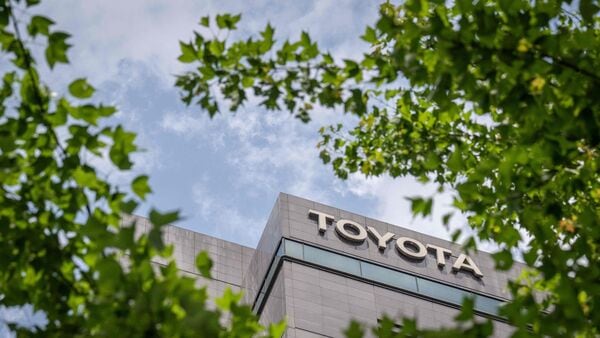
Toyota has issued a cautious forecast after record profits, scandal-induced production cuts
By Sumaiya | Published | No Comments
Toyota’s forecast was based on the assumption that the benefits of the yen’s weakness, which normally boosts the value of repatriated profits,
…

Toyota Motor Corp. gave a softer outlook after recent scandals forced it to cut production, boosting hybrid sales that drove a record profit increase last year.
The company forecast a fall of about 20% to ¥4.3 trillion ($29 billion) in the fiscal year through March 2025, below the market’s consensus estimate of ¥5.3 trillion. For the previous year, it posted an operating profit of ¥5.4 trillion, the highest ever for a Japanese company, according to local media.
Toyota also said it plans to buy back up to ¥1 trillion — or about 3% — of its shares, an announcement that helped limit the share price decline. Shares, which had risen 37% since the start of the year, were whipsawed before closing down 0.56% at 3,579 yen.
“The buyback was a positive surprise,” said Mio Kato, an analyst at Lightstream Research, adding that investors could see it as a sign that Japanese companies will continue to improve shareholder returns.
Also Read: These car makers are accused of leaking private data of customers. Learn more
Takehiko Masuzawa, head of equity trading at Phillip Securities Japan Ltd., said the buyback “could support the market, as more buybacks are expected by other companies in the industry.” He and others note that Toyota, like many other Japanese companies, gives conservative estimates that they later revise upward, for example, an initial estimate for last year’s record-breaking profit was just ¥3 trillion.
“The company’s forecast was conservative but it was expected, and should not necessarily be taken as a negative,” said Bloomberg Intelligence senior auto analyst Tatsuo Yoshida.
Toyota’s forecast was based on the assumption that the benefits of the yen’s weakness, which would normally boost the value of repatriated profits, would be outweighed by costs, including higher raw material prices. It also flagged the growing competition in China.
“The price war in China is getting tougher every day,” said CFO Yoichi Miyazaki. Until we have more battery EVs to offer we will have to last several years.
The company is trying to recover from revelations of fraud at a pair of subsidiaries, which prompted the company to trim production targets while it reviewed business practices across the group. It forecasts total consolidated sales of 10.95 million units in the current year, a slight decline from the 11 million recorded in the previous year.
Chief Executive Officer Koji Sato, who took over from Chairman Akio Toyoda last year, is focused on stemming the fallout and regaining consumer confidence.
“During this financial period, we will spend the necessary time and money to strengthen our footing,” he said on Wednesday.
In December, an internal investigation by Daihatsu Motor Co. found that most of its vehicles were not properly tested for crash safety. And in January, Toyota Industries Corp. suspended all engine shipments after an investigation revealed it had falsified power output figures.
The scandal also damaged Toyota’s reputation, although it produced and sold a record number of passenger vehicles in 2023, beating Volkswagen AG to become the world’s largest carmaker for the fourth year in a row. The company has benefited from a recovery in global demand for hybrids, while rivals have faced weak electric vehicle sales as consumers remain wary of issues such as high prices and battery range.
The Japanese carmaker has long been criticized for being slow to adopt pure battery EVs. The company believes that this change will not happen overnight and that consumers should have access to a variety of vehicles, including combustion engines and hydrogen fuel cells, as well as hybrids.
Toyota, however, said it is committed to EVs for the long term and will invest an additional ¥500 billion to decarbonize and develop next-generation software. Last year, Toyota pledged to sell 1.5 million battery EVs annually by 2026 and 3.5 million by 2030.
“As we strive to build a sustainable future through electricity and hydrogen, battery EVs are missing out,” said Sato. He also said that the 2026 target could include a plug-in hybrid. EVs will account for 75% of new car sales and 44% of passenger vehicles on the road by 2040, according to BloombergNEF.
Date of first publication: 09 May 2024, 10:02 AM IST
| Denial of responsibility! Thelocalreport.in is an automatic aggregator around the global media. All the content are available free on Internet. We have just arranged it in one platform for educational purpose only. In each content, the hyperlink to the primary source is specified. All trademarks belong to their rightful owners, all materials to their authors. If you are the owner of the content and do not want us to publish your materials on our website, please contact us.The content will be deleted within 24 hours. |





